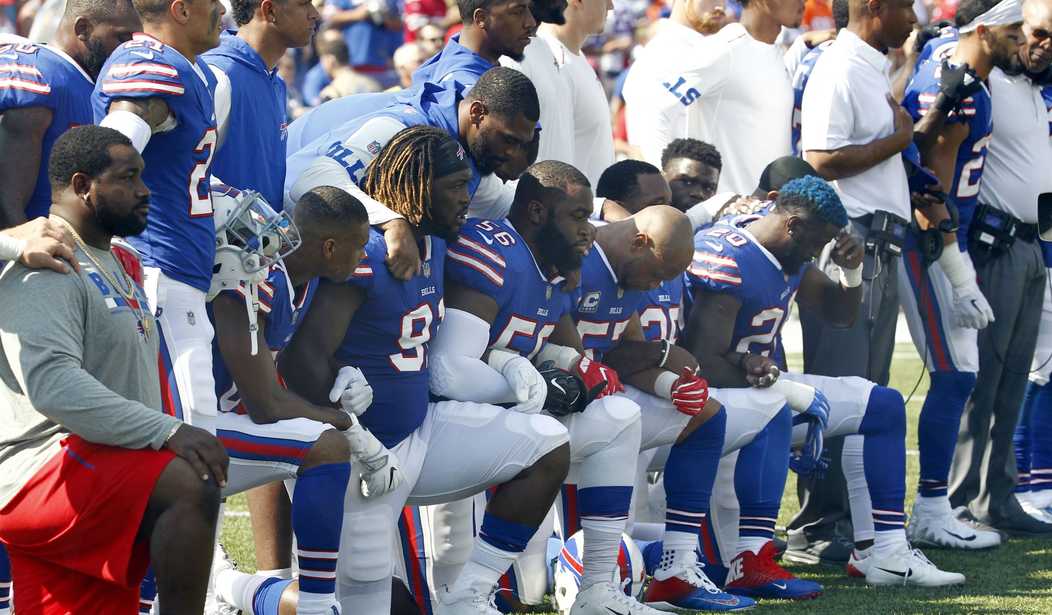In a poll, whites were asked whether the NFL players kneeling in protest during the national anthem are helping or hurting the cause of racial justice. No fewer than 85 percent said they're hurting it.
Clearly, this offense to the anthem and the American flag is the worst possible way to change minds. Blacks need to find a less divisive means to register their discontent.
Oh, wait. I've got that wrong. Those figures don't come from a new poll. They come from a survey taken in 1966 asking whites whether "the demonstrations by Negroes on civil rights have helped more or hurt more in the advancement of Negro rights."
Only 15 percent of whites surveyed thought those peaceful protests would advance the cause of integration and equality. Martin Luther King Jr. and his nonviolent methods are honored even by conservatives today, but in 1967, half of whites said he was harming blacks, with only 36 percent disagreeing.
In many respects, the country has changed a lot since then -- partly because of those unpopular demonstrations. What has not changed is that whites generally resent organized efforts by African-Americans to raise grievances and seek change. Last year, a Reuters poll found that 63 percent of whites disapproved of NFL players kneeling during the anthem -- compared with 17 percent of blacks.
The Black Lives Matter movement is also unpopular among whites. Only 35 percent hold a positive view of it, according to a recent Harvard-Harris Poll, compared with 83 percent of blacks. The negative opinions could be attributed to the noisy, disruptive marches it has held or to the occasional outbreaks of violence that have resulted. The killing of five Dallas police officers at a Black Lives Matter demonstration last year (by a gunman unconnected to the group) also alienated a lot of people.
Recommended
But if you don't like how Black Lives Matter pursues its agenda, you should welcome the NFL players' approach. It's silent; it's not disruptive, and it's entirely nonviolent. It doesn't stop traffic, occupy police or frighten bystanders.
Critics say it's disrespectful to the flag, but no flags are harmed -- and it could be taken as a form of respect for the flag to mutely signal your belief that the ideals it represents are not being realized.
That the display evokes so much fury and disgust among whites, from the president on down, confirms what was evident 50 years ago. The problem is not how blacks raise their complaints about American society; it's that they raise them.
When LeBron James and other NBA players wore shirts that said "I can't breathe" to protest police killings of unarmed black men, Commissioner Adam Silver expressed his disapproval, and Fox News commentator Geraldo Rivera slammed James. When several black St. Louis Rams came out for a game with their hands raised to protest the killing of Michael Brown, the local police union demanded they be punished.
Every time unrest erupts out in black communities in response to some perceived injustice, finger-wagging whites wonder why blacks can't express their dissent in an orderly, law-abiding way. But every time African-Americans protest peacefully, the same whites object to the message, the tactics, the purpose or the slogans.
Unsympathetic whites often ask why blacks are so unwilling to acknowledge progress, to express gratitude for living in a free country and to focus on the problems in their own communities. But unsympathetic whites asked the same questions back in the 1960s. Many whites have always been in a hurry for African-Americans to stop griping about discrimination and get over it.
Detractors demand to know how such highly paid athletes have the nerve to question a country that has rewarded them so richly. They could ask the same question about Donald Trump -- who owes his wealth to a nation that his inaugural address depicted in nightmarish terms.
Trump can insulate himself from the dangers he sees. But these players are as much at risk from bad cops as other black men. A GenForward poll last year found that only 26 percent of young adult African-Americans trust police to do the right thing, compared with 73 percent of their white peers. Small wonder that Colin Kaepernick and other black athletes want to draw attention to what they regard as a mortal danger.
Are there better ways for them to make their point? Maybe so. But it wouldn't make much difference. To many whites, the only good black protest is no black protest.

























Join the conversation as a VIP Member